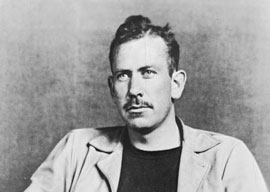
May 06, 2014

John Steinbeck
“[W]hen Tom gives his famous “I”ll be ever”where” speech, I always want to call his parole officer.”
Only a few bylines compel me to set aside my so-called work and read what’s printed beneath them immediately, rather than during some well-intentioned “later” that rarely arrives.
One such writer is Charlotte Allen, a popularizer and debunker in the Carl Sagan/Isaac Asimov mold, but whose field is the humanities (and their faddish mythologies) rather than science.
For instance, her instant-classic January 2001 essay in The Atlantic, “The Scholars and the Goddess,” proved beyond argument that then-trendy alt-religion Wicca was not, as advertised, an ancient, proto-feminist pagan belief system but had in fact been cooked up in the 1950s by an autodidact English civil servant, inconveniently male, one of those flaky, “garden shed,” trainspotting types that sprout so well in British soil.
Allen’s most recent stink bomb was tossed into the op/ed page at the Los Angeles Times, daring to declare that John Steinbeck’s esteemed 1939 novel The Grapes of Wrath“currently the focus of cloying 75th anniversary celebrations; some silly female in the Washington Post has just nominated Ma Joad for president, for example”is, as Allen writes, “peopled with robustly two-dimensional characters and dripping like an okra pod with hokey dialog, shameless sentimentality and corn-pone Marxism.”
Leaning on the fine-tooth-comb findings of Professor James N. Gregory (who, with his Ph.D. from Berkeley, is decidedly not some pesky right-winger), Allen tears apart the alleged historical accuracy of The Grapes of Wrath (a.k.a. “a literary portrait that defined an era“).
Contrary to Steinbeck’s libelous portrayal, real-life “Okies” were far from uniformly rural or illiterate. Over half of those who journeyed from Oklahoma to California were from towns or cities, many of them white-collar or semiskilled workers who found a life there”not in shabby, supposedly exploitive agrarian camps (where, Gregory writes, conditions were “not uniformly horrible” anyhow)”but in well-paying, far less backbreaking jobs.
And that migration had begun even before World War I. It peaked, Gregory discovered, not in the Depression but during the economic boom of the 1940s, when countless Americans, not just Okies, rushed to get jobs in California’s World War II defense plants.
Steinbeck had to know all this, but the facts didn”t suit his narrative.
In that narrative, the banks are the bad guys, but some historians insist that the policies of Steinbeck’s hero, FDR, and not the banks, were what prompted the Okie exodus. (The numbers of which, naturally, Steinbeck exaggerated more than threefold; only about 90,000 individuals like the Joads made the trip, while Steinbeck put the number at 300,000.)